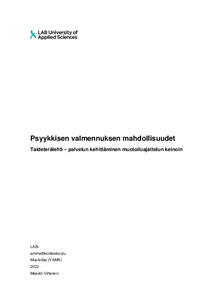Psyykkisen valmennuksen mahdollisuudet : Taideterälehti - palvelun kehittäminen muotoiluajattelun keinoin
Virtanen, Maaret (2022)
Virtanen, Maaret
2022
All rights reserved. This publication is copyrighted. You may download, display and print it for Your own personal use. Commercial use is prohibited.
Julkaisun pysyvä osoite on
https://urn.fi/URN:NBN:fi:amk-2022061417890
https://urn.fi/URN:NBN:fi:amk-2022061417890
Tiivistelmä
Tämän opinnäytetyön tavoitteena on ollut kartoittaa psyykkisen valmennuksen toimintaympäristöä ja palvelumahdollisuuksia palveluntarjoajien ja asiakkaiden näkökulmista. Tutkimusmenetelminä on käytetty laadullista teemahaastattelua ja asiakaskyselyä. Kirjallisuuden ja menetelmien avulla on tavoitteena ollut opinnäytetyön laatijan oman Taideterälehti-nimisen psyykkisen valmennuksen liiketoiminnan tehostaminen, erityisesti kilpailuedun kautta, sekä yrityksen palvelumallin jatkokehittäminen.
Opinnäytetyön johdannon jälkeen luodaan katsaus palvelun kehittämiseen muotoiluajattelun viitekehyksessä. Tätä seuraa valmennusammattilaisten teemahaastattelut palvelutarjoajien näkökulmasta, jonka jälkeen siirrytään valmennusasiakkaiden palvelukokemuksen tarkasteluun asiakaskyselyn kautta sekä vertaillaan molempien menetelmien kautta saatuja tuloksia. Lopuksi luodaan Taideterä-lehti -psyykkisen valmennuksen palvelukonseptia sekä pohditaan liiketoiminnan jatkokehittämistä.
Opinnäytetyön tutkimuksellisen osuuden analysoidut tulokset kertovat, että psyykkisen valmennuksen palveluille on kasvava kysyntä. Palveluntarjoajien henkilöbrändi ja ammattitaito korostuvat, samoin moniammatillisuus ja verkostosuhteet työssä. Sosiaalisen median markkinointiin ei ole täysin panostettu tai siihen suhtaudutaan työn eettisen luonteen vuoksi varauksella. Sama koskee asiakaspalautteita, joita ei kerätä systemaattisesti asiakkailta, tai suosituksia, joita on palveluntarjoajien nettisivuilla joko vähän tai ei lainkaan. Asiakkaat kokevat palvelun olevan ammattimaista. Asiakasarvo ja palvelun laatu nousevat tärkeimmiksi valmennuksen valintakriteereiksi. Psyykkisen valmennuksen tulevaisuus näyttää tutkimustulosten perusteella valoisalta. Tietoa palvelusta on kuitenkin parannettava. The aim of this thesis has been to find out potential opportunities that lie within functionality of mental coaching services offered from the perspective of service providers. The research methods used were qualitative thematic interviews, and a customer survey. The goal was to improve the business of Taideterälehti, which is the company of the thesis’s writer, by using various literary works and implementing relative theoretical methods. This was done by focusing on developing a competitive ad-vantage over other service providers and a further development of the company’s own service model.
The framework for service development was introduced after the thesis’ preface. In the next phase, a series of theme-based interviews were analyzed. These interviews were conducted on coaching professionals. After the analysis of the coaching professionals’ responses, the focus shifted to the results of the customer survey, which was conducted on persons who had received coaching. The results of these two sets of data were compared. The remaining phases discussed and formulated Taideterälehti’s business concept, as well as further development opportunities for the company.
After analyzing the results of the thesis, it shows there is a growing demand for mental coaching services. In the field of service providers, personal brand, professional skills, and multi-professional net-work are emphasized. However, the service providers can’t put too much effort into social media marketing because of the ramifications of ethical and professional work. The same goes for publicized customer feedback, or references to use coaching services. It has become clear that the most important criteria for choosing mental coach services is that a potential customer can feel that they are valued and that the service quality is high. The future of the mental coaching seems bright, even though the knowledge of these services needs to be enhanced.
Opinnäytetyön johdannon jälkeen luodaan katsaus palvelun kehittämiseen muotoiluajattelun viitekehyksessä. Tätä seuraa valmennusammattilaisten teemahaastattelut palvelutarjoajien näkökulmasta, jonka jälkeen siirrytään valmennusasiakkaiden palvelukokemuksen tarkasteluun asiakaskyselyn kautta sekä vertaillaan molempien menetelmien kautta saatuja tuloksia. Lopuksi luodaan Taideterä-lehti -psyykkisen valmennuksen palvelukonseptia sekä pohditaan liiketoiminnan jatkokehittämistä.
Opinnäytetyön tutkimuksellisen osuuden analysoidut tulokset kertovat, että psyykkisen valmennuksen palveluille on kasvava kysyntä. Palveluntarjoajien henkilöbrändi ja ammattitaito korostuvat, samoin moniammatillisuus ja verkostosuhteet työssä. Sosiaalisen median markkinointiin ei ole täysin panostettu tai siihen suhtaudutaan työn eettisen luonteen vuoksi varauksella. Sama koskee asiakaspalautteita, joita ei kerätä systemaattisesti asiakkailta, tai suosituksia, joita on palveluntarjoajien nettisivuilla joko vähän tai ei lainkaan. Asiakkaat kokevat palvelun olevan ammattimaista. Asiakasarvo ja palvelun laatu nousevat tärkeimmiksi valmennuksen valintakriteereiksi. Psyykkisen valmennuksen tulevaisuus näyttää tutkimustulosten perusteella valoisalta. Tietoa palvelusta on kuitenkin parannettava.
The framework for service development was introduced after the thesis’ preface. In the next phase, a series of theme-based interviews were analyzed. These interviews were conducted on coaching professionals. After the analysis of the coaching professionals’ responses, the focus shifted to the results of the customer survey, which was conducted on persons who had received coaching. The results of these two sets of data were compared. The remaining phases discussed and formulated Taideterälehti’s business concept, as well as further development opportunities for the company.
After analyzing the results of the thesis, it shows there is a growing demand for mental coaching services. In the field of service providers, personal brand, professional skills, and multi-professional net-work are emphasized. However, the service providers can’t put too much effort into social media marketing because of the ramifications of ethical and professional work. The same goes for publicized customer feedback, or references to use coaching services. It has become clear that the most important criteria for choosing mental coach services is that a potential customer can feel that they are valued and that the service quality is high. The future of the mental coaching seems bright, even though the knowledge of these services needs to be enhanced.
